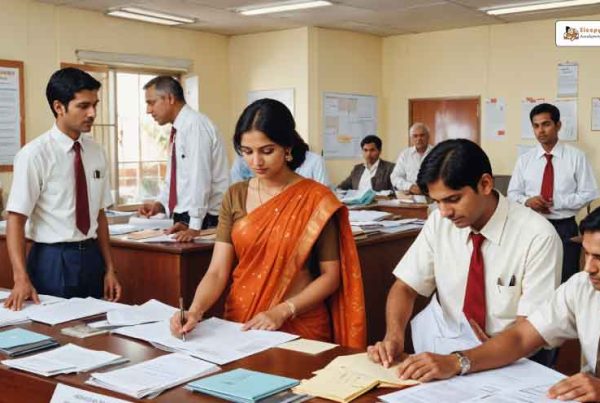The Lal Bahadur Shastri National Academy of Administration (LBSNAA) is where future civil servants of India receive their training. This guide will help you understand the different aspects of the training tenure at LBSNAA, including eligibility criteria, daily routines, and the various modules and activities that shape the journey of an IAS officer.
Key Takeaways
- LBSNAA training is essential for future civil servants in India, providing a mix of academic and physical training.
- Eligibility criteria include age limits, nationality rules, and a specific number of attempts allowed for the entrance exams.
- The training program is divided into phases, including a Foundation Course, Professional Course, and District Training.
- Daily routines at LBSNAA are rigorous, starting with morning exercises and including academic sessions and extracurricular activities.
- Trainees receive support and mentorship from senior officers, peers, and counseling services to help them navigate the challenges of the program.
Eligibility Criteria for LBSNAA Training
To join the Lal Bahadur Shastri National Academy of Administration (LBSNAA) training, candidates must meet specific eligibility criteria. These criteria ensure that only the most suitable candidates are selected for this prestigious program.
Overview of the LBSNAA Training Program
The Lal Bahadur Shastri National Academy of Administration (LBSNAA) offers a structured training program for IAS trainees. This program is divided into three main phases, each designed to build specific skills and knowledge essential for effective administration.
Foundation Course
The Foundation Course is the initial phase of the training. It lasts for 15 weeks and includes a variety of educational courses on topics like national security, land management, and project management. This phase aims to provide a broad understanding of public administration and governance.
Professional Course
Following the Foundation Course, trainees move on to the Professional Course. This phase focuses on more specialized subjects and practical skills. Trainees learn about policymaking, public finance, and other critical areas. The goal is to equip them with the tools they need to handle real-world administrative challenges.
District Training
The final phase is District Training, where trainees are posted in various districts to gain hands-on experience. They work under the supervision of senior officers and get to apply their classroom knowledge in real-life situations. This phase is crucial for understanding the complexities of district administration.
The training at LBSNAA is rigorous and challenging, but also rewarding. It prepares candidates for the many challenges and opportunities they will face in their careers as civil servants.
Daily Schedule and Routine at LBSNAA
The daily schedule at LBSNAA is designed to be rigorous and comprehensive, ensuring that trainees are well-prepared for their future roles. An exercise drill kicks off the day at six in the morning, setting a disciplined tone for the rest of the day. The schedule is packed with a variety of activities, adding up to about 80 hours of involvement every week.
The structured routine helps trainees develop a strong sense of discipline and time management, which are crucial for their future responsibilities.
Morning Exercises and Drills
The day begins early with morning exercises and drills. This includes activities like yoga, running, and other physical exercises. These sessions are crucial for maintaining physical fitness and mental alertness throughout the day.
Academic Sessions
After the morning drills, trainees attend academic sessions. These sessions cover a wide range of topics, including national security, land management, and policymaking. The aim is to provide a well-rounded education that prepares trainees for the diverse challenges they will face in their careers.
Extracurricular Activities
In the evenings and on weekends, trainees participate in various extracurricular activities. These include cross-country runs, horseback riding, and adventure sports. These activities not only provide a break from the rigorous academic schedule but also help in building camaraderie among the trainees.
Academic Curriculum at LBSNAA
The academic curriculum at LBSNAA is designed to provide a well-rounded education to future administrators. The program includes a mix of core subjects, soft skills development, and guest lectures by eminent personalities. This comprehensive approach ensures that trainees are well-prepared for their roles in public service.
Physical Training and Outdoor Activities
Physical training is a key part of the LBSNAA experience. It helps build camaraderie among officers from different states and services, emphasizing teamwork and cooperation. Physical fitness is crucial for officers, ensuring they are in top shape for tasks like crowd control and emergency response. From 5:00 PM to 7:30 PM, officers engage in sports and riding activities. Weekends and holidays offer extracurricular activities like rock climbing, paragliding, short treks, and river rafting.
Facilities and Resources at LBSNAA
The Lal Bahadur Shastri National Academy of Administration (LBSNAA) offers a range of facilities to ensure a comprehensive training experience for its candidates. These facilities are designed to support both academic and personal growth.
Assessment and Evaluation Methods
Exams and Marks
At LBSNAA, trainees undergo various exams to assess their understanding and progress. These exams cover both theoretical knowledge and practical skills. Performance in these exams is crucial as it determines the trainee’s readiness for field assignments. Marks are awarded based on accuracy, depth of knowledge, and application of concepts.
Probation Rules
Trainees are placed on probation during their training period. This probationary period is designed to evaluate their suitability for the civil services. Trainees must adhere to strict guidelines and demonstrate consistent performance. Failure to meet the required standards can result in an extension of the probation period or, in some cases, termination from the program.
Feedback and Improvement
Regular feedback is provided to trainees to help them improve. This feedback comes from senior officers and mentors who closely monitor the trainees’ progress. Constructive criticism is given to highlight areas of improvement. Trainees are encouraged to take this feedback seriously and work on their weaknesses to ensure they are fully prepared for their roles.
Special Programs and Modules
LBSNAA offers a variety of special programs and modules to enrich the training experience of its candidates. These programs are designed to provide practical exposure and a deeper understanding of the diverse aspects of administration in India. These special sessions are integral to the overall training aspect, ensuring that candidates are well-rounded and prepared for their future roles.
Support and Mentorship for Trainees
At the Lal Bahadur Shastri National Academy of Administration (LBSNAA), trainees receive extensive support and mentorship to help them navigate their training and future careers. This guidance is crucial for their development and success in the civil services.
Career Path Post-LBSNAA Training
Initial Postings
After completing the rigorous training at LBSNAA, officers are assigned to their initial postings. These postings are usually at the district level, where they take on roles such as Assistant Collector or Sub-Divisional Magistrate. This phase is crucial as it provides hands-on experience in administration and governance.
Long-term Career Development
As officers gain experience, they move up the ranks, taking on more significant responsibilities. They may become District Collectors, Secretaries in various ministries, or even head important government departments. The career path is designed to ensure continuous growth and development.
Opportunities for Further Training
Throughout their careers, officers have opportunities for further training and specialization. They can attend advanced courses in public administration, policy-making, and other relevant fields. These opportunities help them stay updated with the latest developments and best practices in governance.
The officers must enroll in the two-year LBSNAA IAS training program upon passing the UPSC IAS exam. Members of various public service jobs, such as IFS, IPS, and others, also undergo similar training programs to prepare for their roles.
Challenges and Rewards of LBSNAA Training
Rigorous Training Regimen
The training at LBSNAA is both rigorous and challenging. Trainees start their day at six in the morning with exercise drills. The academic module lasts 15 weeks and includes a variety of educational courses. These courses cover topics like national security, land management, and policymaking. The evenings and weekends are filled with activities such as cross-country runs, horseback riding, and adventure sports. This demanding schedule is designed to prepare candidates for the many challenges they will face in their careers as civil servants.
Skill Development
LBSNAA focuses on developing the candidate’s soft skills, such as leadership, communication, and teamwork. These skills are essential for effective administration. The academy also provides various study tours, field visits, and guest lectures by eminent personalities from different fields. This comprehensive approach ensures that trainees are well-prepared to handle the complexities of public administration.
Personal Growth
Training at LBSNAA is a transformative experience. It prepares IAS officials to meet the complex issues of public administration. From tough academic sessions to challenging physical training, every component of the program is intended to develop competent and ethical leaders. The academy’s emphasis on complete skill development, cultural knowledge, and foreign experience guarantees that probationers are well-prepared to serve the country successfully.
The training is difficult, but anyone with the right attitude and drive can achieve it. A wide range of subjects are covered in the LBSNAA IAS training program, such as academic knowledge, practical skills, and personal growth. Probationers are also afforded the chance to engage with various facets of Indian governance via district training and Bharat Darshan.
Training at LBSNAA is both tough and rewarding. Trainees face many challenges, from intense physical drills to rigorous academic sessions. But the rewards are worth it. Graduates leave with strong skills and a sense of accomplishment. Want to know more about the journey? Visit our website for detailed insights and tips.
Conclusion
In summary, the training tenure at LBSNAA is a well-rounded program that prepares candidates for the multifaceted challenges of public administration. The rigorous academic curriculum, combined with physical training and extracurricular activities, ensures that trainees develop both the hard and soft skills necessary for effective governance. The inclusion of field visits, study tours, and guest lectures by experts further enriches the learning experience. Ultimately, the LBSNAA training equips future civil servants with the knowledge, skills, and ethical grounding needed to serve the nation with distinction.
Frequently Asked Questions
What are the age requirements for LBSNAA training?
Candidates must be between 21 and 32 years old as of August 1, 2024. There are age relaxations for certain categories, like up to 5 years for Scheduled Castes and Scheduled Tribes.
Can people from other countries join LBSNAA?
Yes, people of Indian origin who have migrated from countries like Pakistan, Burma, Sri Lanka, and certain African countries can join, provided they have a certificate of eligibility from the Government of India.
How many times can I attempt the exam for LBSNAA?
General category candidates can attempt the exam six times. Other Backward Classes can attempt it nine times, and Scheduled Castes have unlimited attempts.
What does the daily schedule at LBSNAA look like?
A typical day starts at 6 AM with morning exercises. This is followed by academic sessions, extracurricular activities, and physical training throughout the day.
What kind of physical training is included at LBSNAA?
Physical training includes morning exercises, cross-country runs, horseback riding, and adventure sports.
What subjects are covered in the academic curriculum at LBSNAA?
The curriculum includes core subjects, soft skills development, and guest lectures on topics like national security, land management, and policymaking.
Are there any special programs during the LBSNAA training?
Yes, special programs like Bharat Darshan, foreign attachments, and cultural activities are part of the training.
What kind of support is available for trainees at LBSNAA?
Trainees receive guidance from senior officers, peer support, and counseling services to help them through their training.





